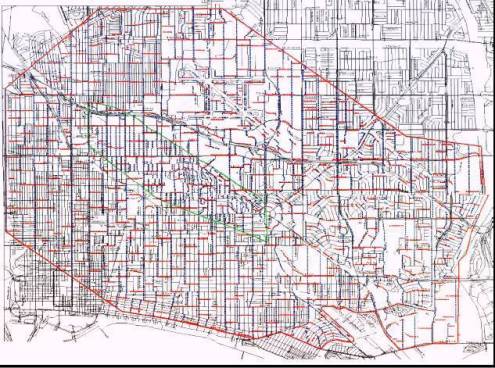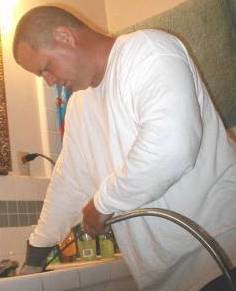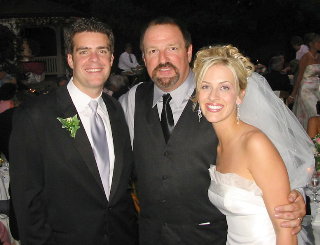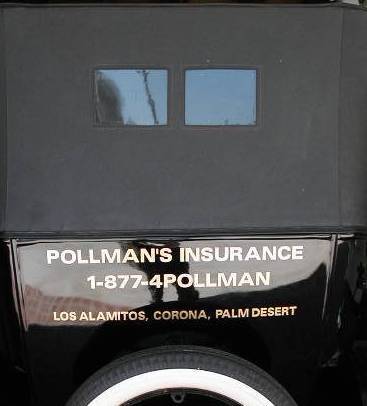|
News City Mgmt. Report Says Vibes To Find Underground Oil More Than City Hall Bargained For; Permit Revoked Pending Oil Co. Decision On Whether To Appeal
(January 16, 2006) -- In a report agendized for City Council presentation on January 17, City Hall's Director of Gas and Oil, Chris Garner, says a plan by Signal Hill Petroleum, Inc., approved by City Hall, to locate underground oil (holding potential revenue for the company and royalties for the City) which "had been represented to the City by SHP as resulting minor ground vibration, similar to the 'ultrasound used to create pictures of unborn babies within a motherís womb,' was, in fact, a much more significant ground vibration" as Jan. 7-9 experienced by Wrigley area residents.
As separately reported by LBReport.com, the procedure originally envisioned by the company and City Hall planned to involve neighborhoods across a large area of the city extending considerably beyond Wrigley (see map posted below).
However in the report scheduled for Jan. 17 Council presentation, Oil & Gas chief Garner indicates based on a number of concerns (cited in his report's text detailed below) "the decision was made to have [Signal Hill Petroleum] halt the project immediately. To protect the property and quality of life of Long Beach residents, it was recommended to the City Manager that the permit be revoked due to the inconsistency between what actually occurred and what was represented when the permit was requested."
The report says the company received written notice of the permit revocation on Jan. 12 and has the right to appeal the decision to the City Council within ten days.
Mr. Garner's report indicates city management expects the company will factor into its decision on whether to appeal "discussion and reaction by the City Council and the public related to this report and, more importantly, to [the company's] expected presentation of actions they propose to implement to alleviate the concerns of the City and public to the seismic study."
As proposed by the company and initially permitted by City Hall, the procedure was slated to involve the area encompassed in red in the map below:

The map's color coding is explained in text below; click map for a clearer pdf image but caveat: the pdf file is 5.2 MB and may require a longer than usual download time. |
In the report slated for Jan. 17 presentation, LB Oil & Gas chief Garner tells the City COuncil and the public:
Signal Hill Petroleum (SHP) is a private oil and natural gas contractor and is the operator of several oil recovery units within the Long Beach Oil Field (near the Long Beach Airport). From January 7 through January 9, 2006, SHP and its contractor, Ameridian, began conducting a 3D seismic survey on streets in the Wrigley area of Long Beach, under a Special Events Permit. The survey requires four large trucks to stop at a site at which, utilizing special equipment
mounted on the trucks, acoustic waves are inducted into the ground creating echoes from deep
within the earth. The echoes are captured via geosensors that provide data to create 3D images
of the subsurface. The primary intent is to greatly enhance the ability to locate oil and natural gas fields.
What had been represented to the City by SHP as resulting minor ground vibration, similar to the "ultrasound used to create pictures of unborn babies within a mother's womb," was, in fact, a much more significant ground vibration. The vibration was strong enough that nearby residents complained of cracks in ceilings and walls, of a glass globe falling and breaking, of objects falling off shelves, windows shaking, damage to a 1" water pipeline that resulted in leakage, crying babies, barking dogs, etc.
At the Wrigley Neighborhood Association meeting on January 9, 2006, there were numerous
residents attending who vocalized their strong displeasure with not only the excessive vibration and noise, but also: 1) the length of time the trucks were stationed at one location (expected to be less than 10 minutes, but the trucks were at one location for several hours due to a technical dysfunction); 2) lack of proper notification for the surrounding area residents; 3) misleading notification with unresponsive contact phone numbers; 4) lack of an adequate call center to handle the complaints; 5) the weight of the trucks and possible damage to the streets (each of the four truck weighs 60,000 pounds); and 6) the miles of geosensor cables that were laid along major corridors, such as Atlantic, stretching from Downtown to Bixby Knolls.
Based upon the above concerns as well as personal observation of the actual testing, the
decision was made to have SHP halt the project immediately. To protect the property and
quality of life of Long Beach residents, it was recommended to the City Manager that the permit be revoked due to the inconsistency between what actually occurred and what was represented when the permit was requested. On Thursday, January 12, 2006, SHP received written
notification that the permit had been revoked, and that SHP had the right to appeal the decision to the City Council within ten days.
This matter was reviewed by Deputy City Attorney J. Charles Parkin on January 12, 2006.
TIMING CONSIDERATIONS
There are no timing considerations for this action other than SHP may decide to exercise its right to appeal the revocation of the permit. SHP will factor into that decision discussion and reaction by the City Council and the public related to this report and, more importantly, to SHP's expected presentation of actions they propose to implement to alleviate the concerns of the City and public to the seismic study. Signal Hill Petroleum will incur costs of $55,000 per day during the delay until the City Council denies or accepts SHP's appeal.
FISCAL IMPACT
There is no fiscal impact associated with this action. However, termination of the seismic study will reduce the possibility of locating and producing potential oil and natural gas deposits within the Long Beach area along with the associated potential loss of revenue. The City of Long Beach is one of many mineral rights owners that would realize revenue from producing such oil and natural gas.
SUGGESTED ACTION:
Approve recommendation.
CHRISTOPHER J. GARNER
DIRECTOR OF LONG BEACH GAS AND OIL
APPROVED:
GERALD R. MILLER, CITY MANAGER
[By Ass't City Mgr. Christine Shippey]
As previously reported by LBReport.com, the events stem from Nov. 2004 City Council approval of a five year contract giving City Hall a financial stake in royalties if underground oil is found and extracted.
That original item -- placed on the Council's consent calendar (for which public and Council discussion isn't anticipated) just days before Thanksgiving -- indicated SHPI desired to "collect technically advanced geological information in the Long Beach Oil Field by conducting a three-dimensional (3D) seismic survey. The new geological information will be used to improve both the waterflooding operations and the ultimate oil recovery from the field. While the seismic equipment is onsite, SHPI is interested in expanding the survey area beyond the limit of the Long Beach Oil Field and into areas where the City owns the mineral fee interests in anticipation of finding additional oil reserves to develop."
The item indicated SHPI proposed to lease approximately 1,100 acres of City mineral-fee property adjoining the Long Beach Oil Field to conduct the survey at $15 per acre per year for a minimum of five years with no right to surface entry. "Should the survey result in commercial production of mineral resources in the leased acreage, the City would receive a one-sixth royalty of gross revenues, which is the industry standard [generating] approximately $15,000 per year to the Upland Oil Fund (SR 134) for the next five years. If mineral resources were commercially developed by SHPI, the Upland Oil Fund would realize unanticipated additional revenues through well permits, barrel tax, and royalties."
The matter drew no Council response at the time...although octogenarian Council communicator Thomas Murphy pulled it for discussion and read it aloud. [We also failed to grasp its significance at the time].
On September 13, 2005, management agendized an informational report describing the anticipated testing as consisting of "a line of specialized vibrator trucks, each containing a base plate that sends sound waves deep into the earth. At each location marked in red on the attached map [below], three or four vibrator trucks will occupy the location for less than ten minutes at a time and then move on to the next location. While virtually all of the sound waves are directed deep into the earth, a very minor surface vibration is also generated in
the immediate vicinity of the trucks. This vibration will dissipate to a "zero level"
very quickly as it travels away from the trucks." The item prompted neither Council nor public discussion [and also escaped our attention].
The Sept. 2005 item included a map (black and white in some agendas, hard to discern, but obtained by us from the City Clerk in color) and posted as study area map [caveat: 5.2 MB large file] . It indicates the procedure was envisioned to take place in a large portion of LB.
Roughly two days after the first testing began, an incensed Wrigley Association president Joan Greenwood told the Jan. 10 City Council meeting that her neighborhood said she and other area homeowners were physically and emotionally shaken by tests.
"This is a prime example of something that may have been the right thing to do but it was executed the wrong way," Ms. Greenwood said, adding:
Ms. Greenwood: ...Many of my neighbors were greatly disturbed...[W]hen they created those underground acoustical waves to look at the subsurface in their search for oil, which is associated with earthquake faults, my house vibrated. You could feel the vibration. It wasn't the rolling motion like an earthquake.
We have land that is subject to subsidence, and as a result several homeowners had serious cracks and damage done to their house...What we had was four trucks pounding the earth...and each time they made that pound, your house vibrated. You heard every pane of glass in your home rattle. It frightened dogs. It frightened children. It frightened my husband. It frightened me...
This was the wrong way of doing this, and I know why it was done this way. It was done this way 'cause it's easier to beg forgiveness than to get permission.
We want this testing stopped...[I]t should be stopped until an engineering geologist and structural engineers have determined whether or not this testing can be safely conducted in a site-specific situation like Wrigley.
Reached for comment on January 11 (after city management had revoked the testing permits), an official with the company's geophysical survey told LBReport.com the vibration-inducing trucks weren't capable of generating over about one on the Richter scale and the company had data to prove it. He said the company was awaiting an opportunity to discuss the matter with city management.
Meanwhile, up the street at the January 10 Signal Hill City Council meeting, two items related to the testing were pulled off the agenda. SH City Manager Ken Farfsing told the SH Council that Signal Hill Petroleum had called and asked to table [remove from the agenda] an item in which the company was scheduled to make a presentation on its "geophysical survey." SH city staff had separately agendized its own report on the survey...which was also removed at the request of city management.
SH City Manager Farfsing added publicly, "Signal Hill Petroleum indicated that they were going to go back to the drawing board and probably do a much smaller seismic study." .
Parts of Lakewood are also indicated on the map...although it's unclear what the status of that city's stance on the testing is.
Related coverage:
News in Depth: LB City Hall OK'd Vibration-Inducing Testing For Underground Oil In Neighborhoods Across Large Part of LB; We Post Color-Coded Map Showing Locations; City Hall Has Suspended Testing For Now
News in Depth: How LB City Hall Invited Vibration-Inducing Tests Into LB Neighborhoods To Find Underground Oil
Bad Vibrations? Wrigley Homeowners Rocked & Riled By Firm's Tests Inducing Vibrations To Find Underground Oil; City Hall Suspends Permit For Now
Return To Front Page
Contact us: mail@LBReport.com
|

DrainPros: Unclog Drains + Full Service Plumbing, Locally Owned Pros. Info, Click Here
 Mike & Kathi Kowal know Los Cerritos, Bixby Knolls, Cal Hts. and beyond. Click to learn more Mike & Kathi Kowal know Los Cerritos, Bixby Knolls, Cal Hts. and beyond. Click to learn more

Wedding Entertainment Planning Is His Specialty. Bill Lovelace Delivers Personalized, Wedding Event Services. Get Info, Click Here

Preserve Your Family's Most Precious Photos and Videos on DVD. Click For Info

Carter Wood Floors, a LB company, will restore your wood floor or install a new one. Enhance your home. Click pic.
|









